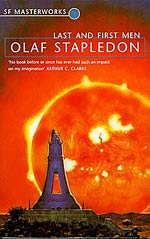
![]() Sable Aradia
Sable Aradia
8/28/2016
![]()
Read for the SF Masterworks Reading Challenge. Check out our Science Fiction Masterworks Book Club!
This is a groundbreaking work by Olaf Stapledon. Written in the 1920s, this is perhaps the first ever future history, predating even H.G. Wells' The Shape of Things to Come, and it's probably the first to try to examine vast expanses of time in a speculative future history, covering in a few pages a period of millions of years. That being said, I found it a real struggle.
The first half of the book read, for me, like a not particularly well-written textbook. The premise is that a human being from the extremely far future has projected its consciousness into the past to dictate a future history to one of us, the First Men, its ancestors (the gender of this future person is never clarified - something I rather liked.) The narration style jumps sporadically between a textbook third person omniscient to seemingly-random third person or even second person personal. In other words, the writing style was one that I found to be horribly clumsy and awkward, made more difficult by the archaic 1920s language style. Just as I was beginning to identify with the point of view of some random, usually nameless person that the author chose to offer us, that perspective would stop and we would be forced back into textbook narration. It was jarring and frustrating and in places tedious.
Yet I would still recommend this book to true science fiction fans.
Why? Because the ideas presented in it really are brilliant. For me a novel is about something happening to people I care about, but to Stapledon, these people are all symbols of the vaster theme that he is describing, which is the song of life, and the struggle of life to triumph over death, no matter how vast and terrible the odds. How it succeeds in spite of itself, but never in a way that matches the vision of any one person or even one people (and thank the gods for that!)
He is also exploring another theme a little closer to our hearts; what does it really mean to be human? Stapledon's humans experience drastic metamorphoses, both physical and spiritual, and his Last Men would hardly be recognized by us as human at all. And yet, I think they really are. You'll have to judge that for yourself.
In the 1920s, Stapledon's future is also inclusive. Races cease to matter; gender becomes far more fluid; sexual morality changes from culture to culture; women are equal participants in the future of our species. In the 1920s this is a trait worthy of my profound respect.
In the end, I ended up liking it despite myself. The theme of the cycles of life and death and the beauty of the cosmos spoke to me on a profound spiritual level. In retrospect I realize that even the tedious first half was necessary for the completion of the dissertation; that life is beautiful because it is finite, and that the struggle for life is a worthy, even holy, endeavour.
But I guess that's the point of a reading challenge, isn't it? To read a book you wouldn't normally read, and find something worthwhile in the experience.
Don't read it if you're looking for a light fun read. Don't read it if you hated school. Don't read it if you want to escape life for a while. But if you want to contemplate history and the universe in serious depth, it's worth it to struggle through.